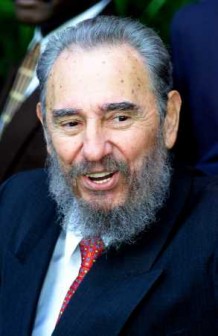HAVANA (Reuters) – Cuban revolutionary leader Fidel Castro said yesterday he quit all his official positions when he fell ill in 2006, including head of the ruling Communist Party.
His comments in a column published in state-run media appeared aimed at dampening speculation about his future that has preceded a party congress next month.

Even though it was widely known he was not doing the day-to-day job of party leader, he has never publicly resigned the post, as he did the Cuban presidency in February 2008.
“I resigned without hesitation all my state and political positions, even that of First Secretary of the Party, when I got sick and I never tried to exercise them after the proclamation of July 31, 2006,” he wrote, referring to a statement disclosing that he had undergone surgery for intestinal bleeding and would cede power temporarily to his younger brother Raul Castro.
He never tried to take up his old position even when he had partially recovered, but he said people kept “affectionately” referring to him as party leader.
Castro, 84, suggested in November that he had stepped aside, telling a group of students he had “delegated” all his powers and had not hesitated “in letting go of my positions.”
Raul Castro, who officially succeeded his brother as president in February 2008, is said to have taken over the role of party leader and many expect he will keep it at the congress, where a new central committee for Cuba’s only legal political party is slated to be elected.
Raul Castro has spearheaded economic reforms aimed at saving Cuban socialism that are expected to be affirmed by the congress, which starts in mid-April and is the first since 1997.
He has said the congress is likely to be the last for the generation of leaders who have held power since toppling a US-backed dictator in a 1959 revolution.
Fidel Castro led the rebellion from the Sierra Maestra mountains in eastern Cuba and ran the country for 49 years before he was felled by intestinal problems he said nearly killed him.
He transformed the Caribbean island into a communist state at the doorstep of the United States and became a world figure for revolutionary causes.
His health problems forced him to stay out of public view for four years before he re-emerged last July. He maintained a public presence by writing columns for state media and is believed to still play a behind-the-scenes role.








